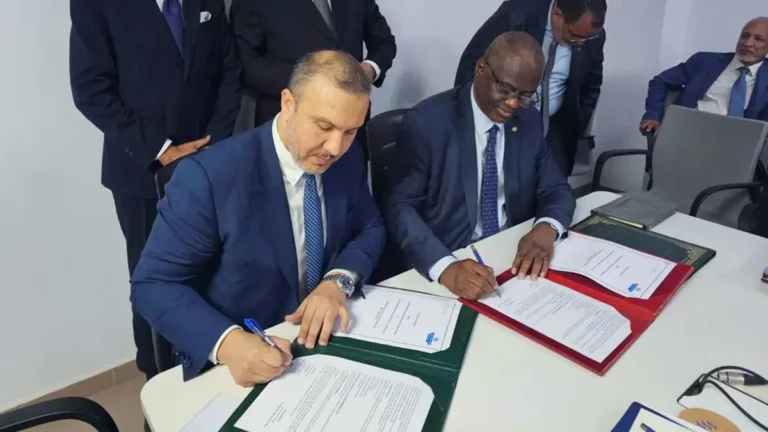Morocco and Mauritania have taken a significant step forward in their expanding strategic partnership with the signing of a landmark power interconnection agreement.
On Thursday, in Nouakchott, senior energy officials from both nations formalized this historic accord, marking a decisive move toward enhanced regional cooperation in the energy sector.
This initiative is expected to transform electricity distribution in West Africa, addressing mounting regional instability and separatist threats. It aims to bolster energy security while promoting economic integration between the two countries.
The signing ceremony was attended by Tarik Hamane, Director General of Morocco’s National Office of Electricity and Drinking Water (ONEE), and Sidi Salem Mohaned Elabd, his counterpart from Mauritania’s Electricity Company (SOMELEC), alongside Hamid Chabar, Morocco’s Ambassador to Mauritania.
The agreement establishes an electric interconnection between Morocco and Mauritania, linking the kingdom’s advanced infrastructure with its neighbour’s developing power network. This project aligns with both
countries’ broader strategy of enhanced cooperation, opening the door for significant renewable energy synergies.
“This power interconnection presents an unprecedented opportunity for renewable energy development,” stated Tarik Hamane, during the ceremony, highlighting both nations’ vast clean energy potential. His
Mauritanian counterpart, Sidi Salem Mohaned Elabd, emphasized the project’s role in strengthening energy links between African and European markets.
Following the signing, technical teams from ONEE and SOMELEC immediately began coordination meetings, signaling both sides’ commitment to swiftly implementing this structural initiative. Geopolitical and Economic Implications
Beyond its technical scope, the power interconnection deal carries major geopolitical significance.
Mauritania, increasingly aligning itself with Morocco, has distanced itself from the Polisario Front, which opposes Rabat over the Western Sahara issue.
This shift was evident when Nouakchott blocked Polisario leader Brahim Ghali from attending a regional conference in December.
Additionally, President Mohamed Ould Cheikh El Ghazouani softened his stance on the Sahara conflict in a speech before the United Nations General Assembly in September.
The energy agreement is also part of a broader Moroccan strategic initiative, which includes a 53-kilometer highway project launched by the Royal Armed Forces in February 2024. This new trade corridor aims
to replicate the success of the Guerguerat border crossing, ensuring smooth commercial exchanges between the two nations.
The intensifying partnership between Rabat and Nouakchott is further reflected in increased diplomatic engagement. President Ghazouani’s visit to Morocco in December 2024 led to a series of high-level
meetings, including talks between Moroccan Foreign Minister Nasser Bourita and Mauritanian Foreign Minister Mohamed Salem Ould Marzouk at the UN General Assembly.
Economically, this deal is crucial for Mauritania, which faces growing electricity debts from Mali—estimated at 50 billion CFA francs—and increasing security concerns due to the presence of Wagner Group mercenaries along its borders.
Moreover, Mauritania is expanding the scope of the interconnection project to include internet and telecommunications networks operated by Morocco’s Maroc Telecom, further solidifying economic and
technological cooperation between the two nations.
Mauritania’s rejection of Algeria’s proposal to create an exclusive Maghreb Union underscores its commitment to its strategic alliance with Morocco, viewing the kingdom as a key partner amid growing instability in the Sahel region.
MK/te/sf/lb/gik/APA


